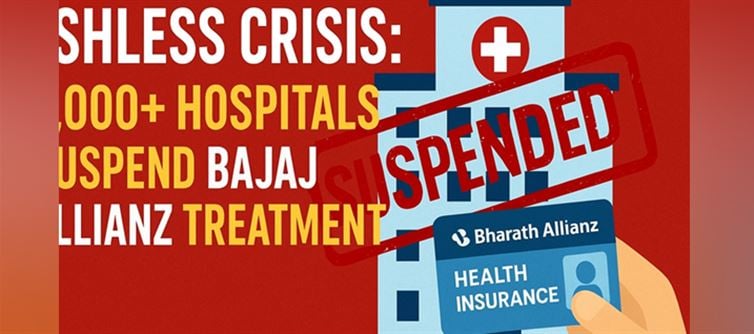
Starting September 1, 2025, over 15,200 hospitals across India — including giants like Max and Medanta — will suspend cashless treatment for Bajaj Allianz health Insurance policyholders. The move, triggered by long-standing disputes over reimbursement rates, delays, and unilateral deductions, has left lakhs of customers worried. Here’s a breakdown of what’s happening, why it matters, and what comes next.
1. Why Hospitals Pulled the Plug
According to the Association of Healthcare Providers of india (AHPI), the tariffs agreed upon with Bajaj Allianz are outdated by years.
With medical inflation at 7–8% annually, hospitals say they cannot sustain quality care on such low, old rates.
To make things worse, Bajaj Allianz allegedly refused to revise tariffs and instead pushed for further reductions, leading to a breaking point.
2. What This Means for Patients
From Sept 1, Bajaj Allianz policyholders will lose access to cashless facilities at AHPI member hospitals.
Patients can still get treated, but must pay out-of-pocket first and later claim reimbursement from the insurer.
For serious cases like ICU admissions, surgeries, or emergencies, this could mean a massive financial burden upfront.
3. Not Just Bajaj — Care health Also on Notice
AHPI has also warned Care health Insurance, demanding a response by August 31.
If Care fails to resolve disputes, its policyholders too could lose cashless access across thousands of hospitals.
This signals a wider rift between insurers and hospitals that could affect millions of customers.
4. The Bigger Battle: Tariffs vs. Inflation
Hospitals want tariffs revised every two years to keep up with rising costs and ensure sustainable care.
Bajaj Allianz, however, has reportedly resisted these revisions and even imposed unilateral deductions.
AHPI insists this suspension is temporary, and services may resume once fair, sustainable agreements are reached.
5. Regulator’s Role in Protecting Policyholders
Patients buy health insurance for the assurance of cashless care during emergencies.
With hospitals and insurers in a deadlock, customers are the biggest losers.
Experts argue that the IRDAI (Insurance Regulatory and Development Authority of India) must step in to protect patients’ rights and prevent such disputes from punishing policyholders.
Bottom Line
The suspension may be temporary, but it exposes a crucial fault line in India’s health insurance ecosystem: rising costs, rigid insurers, and helpless patients caught in the crossfire. Unless regulators step up, cashless health insurance — once sold as peace of mind — risks becoming a hollow promise.




 click and follow Indiaherald WhatsApp channel
click and follow Indiaherald WhatsApp channel